at the Oregon Shakespeare Festival
Snow in Midsummer
By Frances Ya-Chu Cowhig
Based on the Play The Injustice to Dou Yi That Moved Heaven and Earth
by Guan Hanqing
Directed by Justin Audibert
Snow in Midsummer may be the best production of the Oregon Shakespeare Festival season. It certainly is the best production most likely to be overlooked by old-chestnut-seeking, casual theater goers.
One reason Snow is a candidate for audience neglect is that it’s a new play that hasn’t been vetted by Broadway. Another reason is that the publicity for Snow makes it sound intellectual and good-for-you. You learn that it’s an adaptation of an ancient and traditional Chinese story, clearly on the OSF playlist to further diversity and expand the cultural horizons of the audience, and its all-Asian cast sets off my pandering alarm bells.
But even before the curtain goes up, you start to realize your assumptions were wrong. Snow is modern, engaging story. Instead of what I feared, stylized Chinese Theatre from the 1200’s (the time when the original playwright lived), we are dealing with people in a very modern setting, magic, pollution, and, most importantly, an incredibly tight mystery complete with a important ghost and up-to-date social commentary.
The problem with talking about details of the story, even the general plot, is that the writing is incredibly, rewardingly tight. Not only does the gun shown in Act I get fired before the end of the play, a toothpick that is shown onstage in Act I is also used before the final curtain.
So, I cannot say too much about the characters or action without sharing the knowledge I had acquired by the end of the play.
It’s hard to banally mention the toothpick without calling it the mass-murdering implement it becomes in Act II.
Well, there are no toothpicks in Snow. But the complexity of the characters and plot are real. And, satisfying. Surprising. Obvious. Meaningful.
The simple story is of a factory town in modern China that is suffering from a three-year drought. The current factory owner, Handsome Zhang, (Daisuke Tsuji) plans on selling the factory to Tianyun (Amy Kim Waschke) who arrives in town on an inspection trip with her young daughter, Fei-fei (Olivia Pham). Just before Tianyun makes her entrance at the village watering hole run by Mother Cai (Nastsuo Ohama), Handsome uses the venue to propose marriage to his long-time boyfriend, Rocket Wu (Will Dao). Plans are interrupted by Dou Yi (Jessica Ko), the ghost of a woman wronged by the town.
That description doesn’t sound engaging. It certainly does not match the captivating and exciting real-life two-plus hours of theater. The playwright, director, and cast have managed to take the drab-sounding outline and use it like a Russian doll with layers and layers of additional meaning and connection. Each scene goes deeper into the town and people. Revelation after revelation hits you, each feeling inevitable as soon as they are shown. The story deepens, characters add dimensions and change.
World-class acting is one of the reasons Snow works so well. Five major roles are filled flawlessly.
Jessica Ko as Dou Yi flows between simple storytelling and fantasy scenes, sometimes mid sentence. She is contained and on track every moment. She is also delightful in the stage-setting, opening-curtain interaction with the audience. At that point we don’t know who she is, but the extra moments at the start with her reinforce the goodness of her character.
Will Dao has similar mastery over his this-life and next-life moments as Rocket Wu. In earlier moments, he makes believable the effects of a ghost on his terran-world physical body, all the while sharing with the audience his character’s nature and strengths. Later on stage, he is a perfect balance of eatherial and the practical, with some comedy thrown in. And, this leaves out his first moments as a focused, but somewhat shallow, enthusiastic fiancee.
The complementary dichotomies keep on coming!
The riskiest writing in Snow was giving much of the action and revelatory dialog to the Fei-fei, a grade school student. Frankly, I would never have the guts to hand so much of my play to such a young person. How OSF found Olivia Pham for that role and integrated the first-time actor so well is a stroke of luck/skill/something wonderful.
Pham is perfect. Neither precocious nor silly, this kid plays a kid extremely well. Believable and clear. And, that is a good thing because she has critical dialogue and carries key scenes.
As the new factory owner and Fei-fei’s mother, Amy Kim Waschke, creates her own magic by masterfully revealing layers of her character. Her tightly wound portrayal righteously adds tension as her words also move the story along. An excellent performance.
The fifth major player, Daisuke Tsuji’s Handsome, is just as wonderful as the other top characters. Again, we are shown his outside doll early on and then learn more and more and more as the play goes on. Tsuji’s Handsome is a control monster throughout the play, and we keep learning through his final scene just how intent he is on controlling everything around him.
Although the parts are not as big as the Big Five, other cast members have created real gems of personality and importance. Two deserve special call-outs: Christopher Jean in dual roles as Dr. Lu and Judge Wu well exemplified a/im-moral authority. I also loved Moses Villarama’s worried officer who gave us some needed relief from personality-less bureaucracy.
Monique Holt’s appearance as a deaf Worker Chen caused the creation of a town-specific sign language that is used when she is in a scene. That’s a nice creative thought, and Holt’s presence and the signing helps us see the unfolding story in yet another way.
I am tempted to declare writer Frances Ya-Chu Cowhig the real hero of the play because all of the elements of an compelling story are present, deep, and taughtly delivered. The play was woven, not written. Director Justin Audibert had a clear and focused vision of the complex narrative which maximized the seamlessness of the action.
Crafts excelled, too. Especially Scenic Designer Laura Jellinek’s mood-setting dry open spaces that switched quickly to anxious paranormal spots or hot expanses of execution. The heaps of dead crickets, including loose ones sprinkled on the ground, were exquisite! I think we heard those crickets dying and lots of other truly mood-enhancing background noises created by Sound Designer Paul James Prendergast. You don’t want to invite him to DJ your next upbeat party, but you do want him to work on your next stage production.
The second time I saw Snow, I saw and understood more. Even more dolls were exposed than I saw my first watching. Over and over I heard details of the mystery that were pointed to up front but which I went right by me on my initial viewing. I kept smacking my head, asking, “You didn’t pick up on that? Why else would have THIS happened if it didn’t mean that THAT was going to happen in Act II?” Don’t you do smack your head yourself when you reread a superb mystery?
The real reason to see of Snow in Midsummer is that it is a deep story brilliantly constructed. The mystery and the ghost aspects make tale stronger than your average moralistic classic! Snow benefits from all the its traditional high-brow lineage, the creative team’s diversity, and clear ethical teaching moment. And, Snow’s skilled storytelling executed so well by the onstage talent and crafts, overcomes its weighty pedigree.
Snow in Midsummer winds up being great fun.
Play rating: ![]()

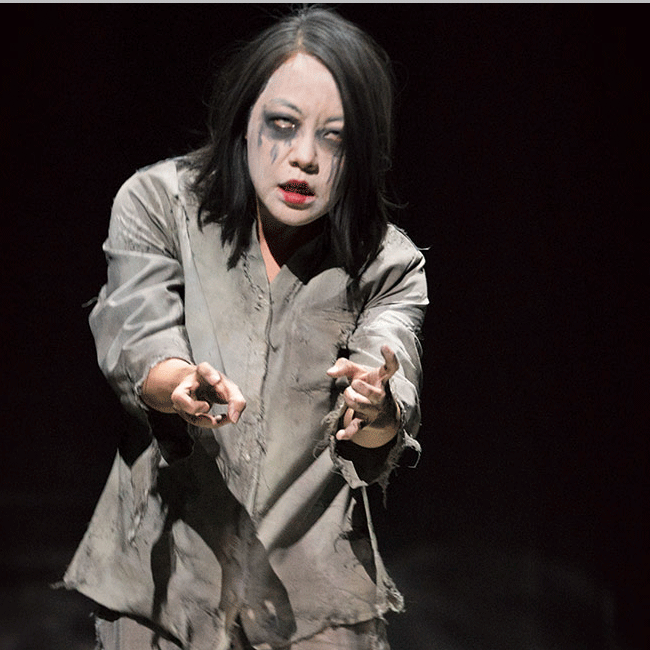
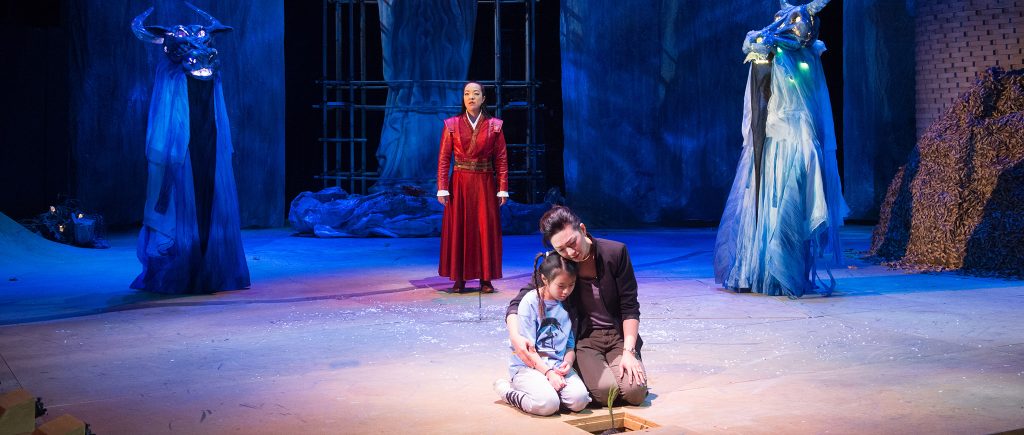
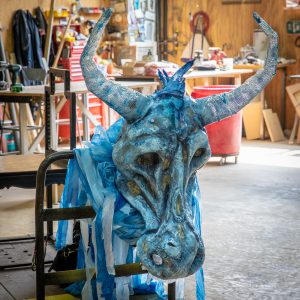
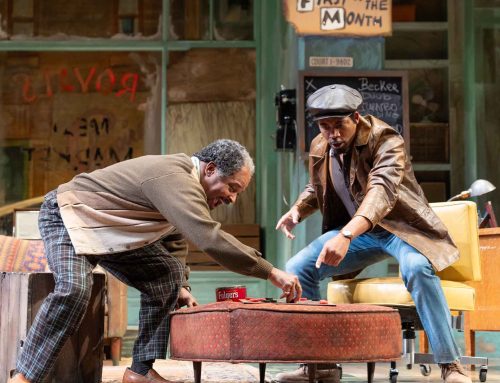


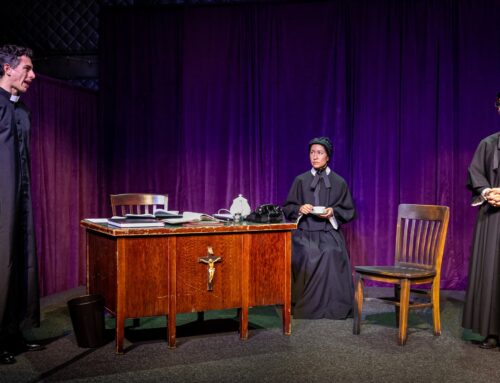
Leave A Comment